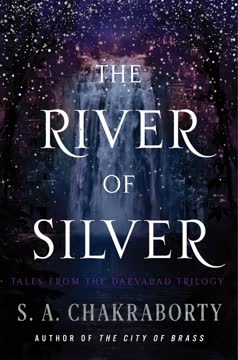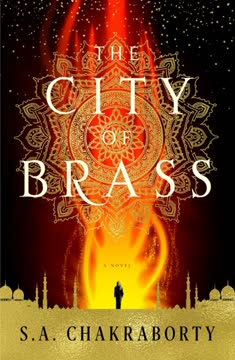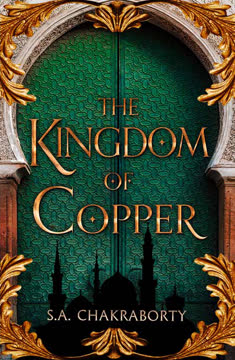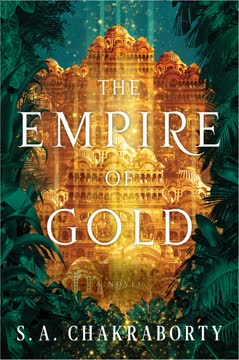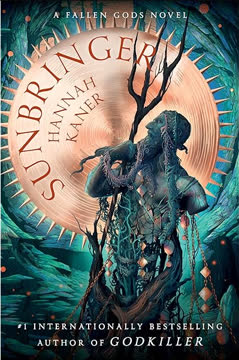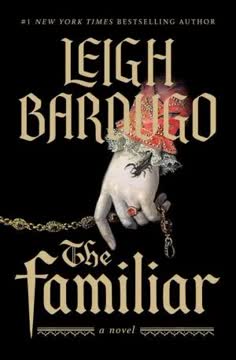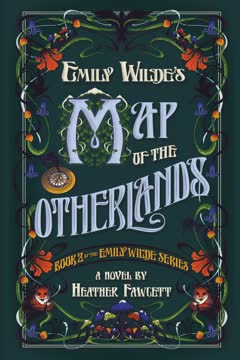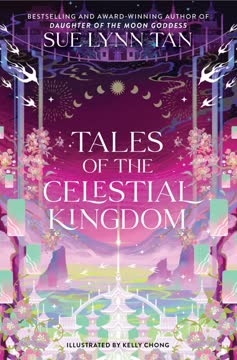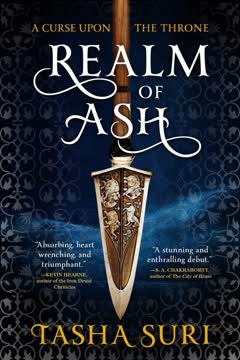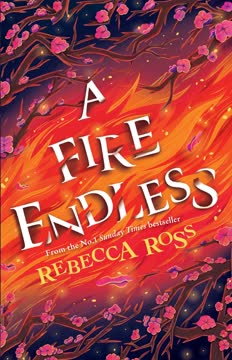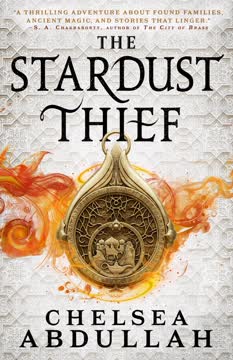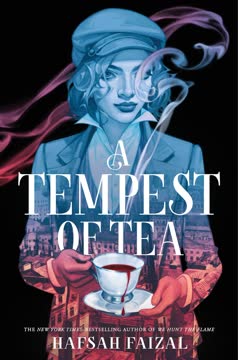Plot Summary
Forbidden Births and Broken Promises
Manizheh, the last of the Nahid healers, cradles her newborn son Jamshid, torn between love and the brutal necessity of hiding his true heritage. In a world where Nahid blood is both a blessing and a curse, she marks her child to suppress his magic, ensuring his survival but severing him from his birthright. Her decision is haunted by the threat of King Ghassan, whose tyranny has already destroyed so much. Manizheh's heartbreak is palpable as she leaves Jamshid behind, vowing to return but knowing the cost of her defiance. Her return to Daevabad is met with suspicion, humiliation, and the cold politics of a court that sees her as both a tool and a threat. The chapter sets the tone for a world where love is dangerous, power is precarious, and every choice is shadowed by loss.
Seeds of Rebellion
Duriya, a shafit servant, navigates the treacherous hierarchies of Daevabad's palace, enduring daily humiliations from the djinn elite. Yet, beneath her obedience lies a quiet resistance—cultivating forbidden molokhia plants in the Nahid gardens, clinging to memories of her Egyptian home, and dreaming of escape. Her unexpected encounter with Rustam, the gentle Nahid healer, reveals the possibility of connection across divides. Their shared love of the earth and small acts of kindness become a subtle rebellion against the city's cruelty. Duriya's story is one of survival, resilience, and the hope that even in a city built on oppression, new life can take root.
Queens, Kings, and Ambition
Hatset, an Ayaanle noblewoman, arrives in Daevabad to marry King Ghassan, forging an alliance meant to stabilize the fractious city. Their courtship is a dance of ambition and vulnerability, each seeking power and security for their people. Hatset's sharp intellect and Ghassan's weary pragmatism create a partnership built on mutual respect, if not love. Yet, beneath the surface, old wounds fester—sectarian divides, the ghosts of murdered Nahids, and the ever-present threat of rebellion. Hatset's entry into the palace is both a promise of change and a reminder that in Daevabad, every alliance is fragile, and every gain comes at a cost.
Children of Power and Pain
Muntadhir, the crown prince, and his siblings Zaynab and Ali, grow up in a palace where love is conditional and danger ever-present. Their childhoods are shaped by the expectations of their father, the weight of their mother's death, and the simmering tensions between djinn and Daeva. Muntadhir's early encounters with Jamshid, the Nahid child hidden in plain sight, foreshadow the tangled loyalties and forbidden desires that will define their adult lives. The siblings' relationships are marked by both tenderness and rivalry, each struggling to carve out an identity in a world that demands sacrifice.
Love, Loyalty, and Betrayal
Muntadhir and Jamshid's relationship blossoms in the shadows of the palace, a love both dangerous and redemptive. Their connection is fraught with the risks of political intrigue, family expectations, and the ever-present threat of exposure. As Jamshid becomes entangled in the royal household, he must navigate the treacherous waters of loyalty to his people and his heart. Their love is a fragile sanctuary, constantly threatened by the machinations of those who would use them as pawns. The emotional intensity of their bond is matched only by the pain of their inevitable betrayals.
Masks, Magic, and Survival
Nahri, a Cairo con artist with mysterious healing abilities, is swept into the world of Daevabad by Dara, the legendary Afshin warrior. Their journey is one of discovery and danger, as Nahri learns the truth of her Nahid heritage and the city's brutal history. In Daevabad, she must navigate a labyrinth of politics, prejudice, and magic, donning the mask of the Banu Nahida to survive. Her resourcefulness and compassion become her greatest weapons, but every victory is shadowed by the knowledge that trust is a luxury she cannot afford.
The Afshin's Return
Dara, resurrected from myth, is both savior and destroyer. His return to Daevabad reignites old hatreds and hopes, as the Daevas see in him the promise of restoration and the djinn remember only bloodshed. Dara's love for Nahri is complicated by his loyalty to Manizheh and the weight of his own sins. He is a man out of time, struggling to reconcile the ideals of the past with the realities of the present. His presence is a catalyst for change, but also a harbinger of violence.
Schemes in the Shadows
As Nahri, Ali, and Muntadhir navigate the treacherous politics of Daevabad, old alliances fracture and new conspiracies emerge. The shafit agitate for justice, the Daevas plot revenge, and the Qahtani family's grip on power weakens. Secrets are currency, and betrayal is inevitable. The city itself becomes a character—alive with magic, haunted by history, and always on the brink of chaos. Every character is forced to choose between personal loyalty and the greater good, with consequences that ripple through the city's very foundations.
The Weight of Inheritance
The legacy of the Nahids, the trauma of the Qahtanis, and the suffering of the shafit all converge as Daevabad teeters on the edge of war. Characters grapple with the expectations of their ancestors, the scars of old violence, and the hope of forging a new path. The city's magic, tied to blood and memory, becomes both a weapon and a prison. Inheritance is revealed as both a blessing and a curse, binding the characters to destinies they struggle to escape.
Shafit, Djinn, and Divides
The shafit—those of mixed human and djinn blood—become the flashpoint for Daevabad's unrest. Their oppression is both a symptom and a cause of the city's instability. Nahri's efforts to heal and unite are met with resistance from all sides, as old prejudices die hard. The djinn tribes, each with their own grievances and ambitions, maneuver for advantage, while the Daevas dream of lost glory. The city's divides are not just political, but deeply personal, cutting through families and friendships alike.
The River's Secrets
Ali, the idealistic younger prince, is forever changed by his encounter with the marid, the ancient water spirits. Gifted—and cursed—with new powers, he becomes both a bridge and a threat to Daevabad's fragile order. His struggle to reconcile faith, duty, and identity mirrors the city's own search for meaning. The river that runs through Daevabad becomes a symbol of both division and possibility, its secrets holding the key to the city's salvation or destruction.
War in the City of Brass
The simmering tensions in Daevabad erupt into open conflict as Manizheh and Dara lead a Daeva uprising against the Qahtani regime. The city is plunged into chaos—palace intrigue gives way to street battles, and old alliances are shattered. Nahri, Ali, and Muntadhir are forced to confront the limits of their power and the cost of their choices. The war is both epic and intimate, its violence echoing the personal betrayals and sacrifices that have defined the characters' journeys.
Sacrifice and Salvation
In the aftermath of war, the survivors must reckon with the consequences of their actions. Dara's quest for redemption leads him to confront the full weight of his past, while Nahri and Ali struggle to heal a city broken by violence. Sacrifice becomes the price of peace—lives are lost, loves are sundered, and the hope of a new beginning is hard-won. The characters' greatest victories are tempered by grief, but also by the possibility of forgiveness.
Aftermath and Reckoning
With the old order destroyed, Daevabad faces the daunting task of rebuilding. Nahri, Ali, and Zaynab step into new roles, forging alliances across tribal and social lines. The process is fraught with setbacks and resistance, as the wounds of the past refuse to heal easily. Yet, amidst the ruins, new communities and possibilities emerge. The characters are forced to confront not only the city's future, but their own—what it means to lead, to love, and to belong.
Healing, Hope, and New Beginnings
As Daevabad's hospital becomes a symbol of hope and unity, Nahri and her allies dedicate themselves to healing both bodies and hearts. The city's magic, once a source of division, is harnessed for the common good. Relationships are mended, new families are formed, and the promise of a more just society begins to take shape. The characters find solace in small joys and the knowledge that even in a world scarred by violence, healing is possible.
The Price of Peace
The survivors of Daevabad's upheaval must navigate the complexities of justice and reconciliation. Old enemies become uneasy allies, and the boundaries between right and wrong blur. The cost of peace is high—requiring not only the punishment of the guilty, but the forgiveness of the broken. The characters' personal journeys mirror the city's own, as they learn that true peace is not the absence of conflict, but the presence of understanding.
Unwritten Futures
In the final reckoning, Daevabad stands transformed—a city no longer defined solely by its past, but by the possibilities of its future. Nahri, Ali, and their companions embrace the uncertainty of what lies ahead, choosing hope over fear. The story ends not with a tidy resolution, but with the promise that the river of silver—like the city itself—will continue to flow, carrying with it the dreams, sorrows, and aspirations of all who call Daevabad home.
Characters
Nahri
Nahri's journey is one of transformation—from a streetwise con artist in Cairo to the Banu Nahida, spiritual and political leader of the Daevas. Her sharp intelligence and compassion are matched by a fierce pragmatism, forged in the crucible of loss and betrayal. Nahri's relationships—with Dara, Ali, and Muntadhir—are complex, shaped by love, loyalty, and the ever-present threat of manipulation. She is haunted by the weight of her heritage and the expectations of her people, yet she refuses to be defined by them. Nahri's greatest strength is her refusal to give up hope, even when surrounded by darkness. Her arc is one of self-acceptance, as she learns to wield her power not just for survival, but for healing and change.
Ali (Alizayd al Qahtani)
Ali is driven by a deep sense of justice and faith, struggling to reconcile his ideals with the brutal realities of Daevabad. His transformation—both literal and spiritual—after his encounter with the marid marks him as both outsider and savior. Ali's relationships with his family, especially his siblings and Nahri, are marked by love, rivalry, and the pain of impossible choices. He is a character torn between worlds: Geziri and Ayaanle, djinn and marid, tradition and progress. Ali's journey is one of sacrifice, as he learns that true leadership requires not just conviction, but humility and the willingness to bear the burdens of others.
Muntadhir al Qahtani
Muntadhir is the embodiment of Daevabad's contradictions—at once a product of privilege and a victim of its expectations. His wit and charisma mask deep insecurities and a longing for genuine connection. Muntadhir's love for Jamshid is both his salvation and his undoing, forcing him to choose between personal happiness and political duty. His arc is one of painful growth, as he confronts the consequences of his actions and the limits of his power. Muntadhir's ultimate redemption lies in his willingness to let go of the throne and embrace a life defined by love rather than ambition.
Jamshid e-Pramukh
Jamshid is marked from birth by secrets and sacrifice, his Nahid heritage both a blessing and a curse. Sensitive and principled, he is often overlooked in the city's brutal politics, yet his quiet courage and loyalty make him indispensable. His relationship with Muntadhir is a rare source of joy and vulnerability, but also a site of profound pain. Jamshid's journey is one of self-discovery, as he learns to claim his power and his place in the world. His healing abilities become a metaphor for the possibility of reconciliation and renewal in a city scarred by violence.
Dara (Darayavahoush e-Afshin)
Dara is both myth and man—a symbol of Daeva pride and the living embodiment of their darkest history. His love for Nahri and loyalty to Manizheh drive him to both heroism and atrocity. Dara's struggle is deeply psychological: he is tormented by the weight of his past, the expectations of his people, and the impossibility of redemption. His arc is one of tragic self-awareness, as he seeks to atone for his sins and find a place in a world that no longer fits him. Dara's story is a meditation on the costs of violence and the possibility of forgiveness.
Manizheh e-Nahid
Manizheh is a force of nature—brilliant, ruthless, and driven by a love that is both protective and destructive. Her choices are shaped by trauma and the relentless oppression of her people, leading her to acts of both compassion and cruelty. As mother to Jamshid and leader of the Daeva rebellion, she is both revered and feared. Manizheh's psychological complexity lies in her inability to escape the cycles of violence that have defined her life. Her downfall is as much a result of her own wounds as the world's injustices.
Zaynab al Qahtani
Zaynab is often underestimated, but her intelligence and empathy make her a formidable player in Daevabad's politics. She navigates the constraints of her gender and status with grace, using her influence to protect the vulnerable and broker peace. Zaynab's arc is one of empowerment, as she steps out of the shadows to claim her role as a leader. Her relationships—with her brothers, with Nahri, and with the shafit—highlight the possibilities of solidarity across divides.
Rustam e-Nahid
Rustam is defined by his gentleness and his suffering. Scarred by years of abuse and loss, he retreats into his work and his faith, finding solace in the garden and the infirmary. His relationship with Manizheh is both a source of strength and a reminder of all that has been lost. Rustam's arc is one of endurance—he survives not by fighting, but by refusing to let the world's cruelty extinguish his compassion.
Duriya
Duriya's story is a window into the lives of the shafit, those caught between worlds and denied agency. Her resilience and ingenuity allow her to carve out moments of joy and connection, even in the face of systemic oppression. Duriya's relationship with Rustam is a rare space of tenderness and possibility, suggesting that change is possible even in the most rigid of systems.
Ghassan al Qahtani
Ghassan is the embodiment of Daevabad's old order—pragmatic, authoritarian, and haunted by the violence required to maintain control. His love for his children is real but always secondary to his vision of the city. Ghassan's psychological complexity lies in his ability to justify cruelty for the sake of stability, and his ultimate downfall is a testament to the limits of power built on fear.
Plot Devices
Interwoven Perspectives and Nonlinear Storytelling
The narrative unfolds through a tapestry of perspectives—Nahri, Ali, Muntadhir, Jamshid, Dara, Manizheh, and others—each offering a unique lens on Daevabad's history and present. This structure allows the reader to experience the city's divisions and alliances firsthand, deepening empathy and complicating easy judgments. The use of nonlinear storytelling—flashbacks, alternative viewpoints, and vignettes—mirrors the fragmented, contested nature of memory and history in a city built on both. Foreshadowing is deftly employed, with early sacrifices and betrayals echoing in later choices, and the city's magic serving as both metaphor and mechanism for the characters' psychological journeys.
Magic as Metaphor and Catalyst
Magic in Daevabad is not just a tool, but a living force—tied to blood, belief, and the scars of the past. It is both a source of wonder and a weapon of oppression, shaping the city's politics and the characters' identities. The loss and restoration of magic serve as metaphors for trauma and healing, while the river, the marid, and the shedu become symbols of both division and unity. The interplay between human and djinn, shafit and pureblood, is mirrored in the city's shifting magical landscape, reinforcing the themes of hybridity, inheritance, and transformation.
Cycles of Violence and Redemption
The trilogy's structure is built around cycles—of violence, revenge, and the longing for justice. Characters are repeatedly forced to confront the legacies of their ancestors, the consequences of their own actions, and the possibility of breaking free from the patterns that have defined Daevabad for centuries. Redemption is hard-won and never complete, but the narrative insists on the possibility of change—both personal and collective. The use of alternative endings, epilogues, and "tales" within the main story reinforces the idea that history is always being rewritten, and that the future remains unwritten.
Analysis
S.A. Chakraborty's The River of Silver is both a love letter and a reckoning—a mosaic of stories that deepen and complicate the world of the Daevabad Trilogy. By centering the voices of those often relegated to the margins—shafit, servants, women, and the wounded—the book interrogates the costs of power, the persistence of trauma, and the radical possibilities of empathy. Its nonlinear, multi-perspective structure mirrors the city's own fractured identity, inviting readers to question easy binaries of good and evil, hero and villain. Magic, here, is not an escape but a crucible, forcing characters to confront the legacies they inherit and the futures they dare to imagine. Ultimately, the book argues that healing—personal, political, and communal—is possible only through honesty, vulnerability, and the willingness to break cycles of violence. In a world as divided as our own, The River of Silver offers a vision of hope rooted not in easy answers, but in the messy, ongoing work of building something new from the ruins of the past.
Last updated:
Review Summary
The River of Silver is a beloved collection of short stories set in the Daevabad world. Fans praise the deeper insights into characters and events, with many calling it a satisfying companion to the trilogy. Readers appreciate the emotional depth, world-building, and character development. Some highlights include stories about Jamshid, Muntadhir, and Nahri/Ali's relationship. While not essential, most reviewers found it a delightful return to a cherished fantasy world, recommending it for fans of the original trilogy.
